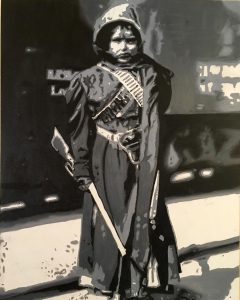re: Against Modernity (source unknown)
Thank you so much for the thorough explanation! I agree that there is a common misconception that modernization implies progress. I saw it first in India, also a poverty-stricken nation led by a corrupt government, as the rich built massive enterprises and became richer at the expense of the vast majority. However, I now see a growing discord between modernization, mainly in technology, with social progress in the US. Your work addresses social commentary that is universally valid in this day and age.
Growing up in the US, I did not know this much about the Mexican Revolution, as it wasn’t taught in my history classes. But seeing as you were also born here also, what sparked your interest in studying Mexico’s history?
I completely relate to the idea of being seen as an outsider in your own country. I hold American citizenship by birth, speak English without an accent, celebrate all of this country's national holidays, and support the US in the Olympics but somehow it is always the color of my skin that indicates my identity. Nationality is masked by race. I’ve had difficulty with my country not owning me in return. I appreciate that you have embraced your cultural and racial backgrounds instead of veering away from them as a consequence of this struggle.

